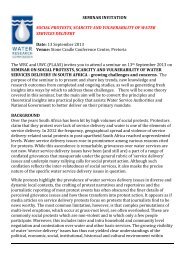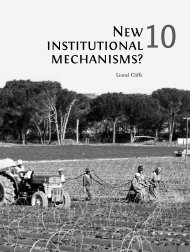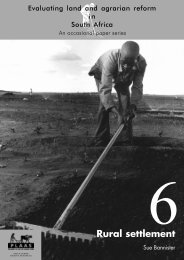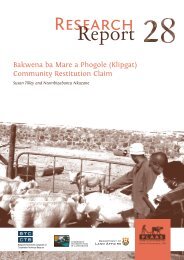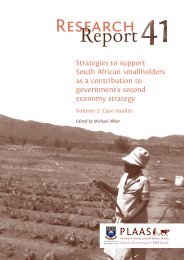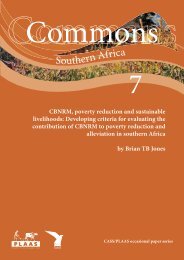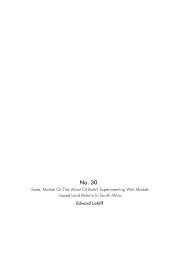A critical appraisal of South Africa's market-based land reform policy
A critical appraisal of South Africa's market-based land reform policy
A critical appraisal of South Africa's market-based land reform policy
Create successful ePaper yourself
Turn your PDF publications into a flip-book with our unique Google optimized e-Paper software.
Chapter 6: LRAD projects in Limpopo<br />
The beneficiaries interviewed identified a<br />
range <strong>of</strong> other support services they felt<br />
would assist them to succeed as farmers.<br />
The majority <strong>of</strong> respondents identified the<br />
lack <strong>of</strong> access to finance for improvements<br />
on the farms and expansion <strong>of</strong> production<br />
as the most significant factor limiting them<br />
in achieving their goals. The next most<br />
commonly identified needs related to the<br />
provision <strong>of</strong> water and improvement <strong>of</strong><br />
roads. Other requirements mentioned by<br />
more than one respondent were: assistance<br />
with <strong>market</strong>ing; provision <strong>of</strong> fodder during<br />
drought periods; agricultural extension<br />
services; and the handover <strong>of</strong> the title<br />
deeds for the <strong>land</strong>.<br />
All the farmers feel they could benefit<br />
from training in a range <strong>of</strong> activities related<br />
to the farm operations. They specifically<br />
mentioned training in the following areas:<br />
financial management, <strong>market</strong>ing, artificial<br />
insemination, veld management, identifying<br />
symptoms <strong>of</strong> different illnesses, application<br />
<strong>of</strong> vaccines, financial management,<br />
record keeping, and business skills. The<br />
only training that has been organised for<br />
the beneficiaries so far was a workshop on<br />
finance and budgeting that the Steilloop<br />
farmers attended.<br />
Challenges, hopes and<br />
recommendations<br />
The beneficiaries have experienced a<br />
range <strong>of</strong> challenges as they have tried to<br />
farm. These have included veld fires,<br />
shortages <strong>of</strong> water, drought, poor or no<br />
roads, damaged fences, theft <strong>of</strong> livestock<br />
and poor disease control. In one case a<br />
respondent believed that it was a neighbouring<br />
white farmer who had burnt his<br />
veld (interview 15). Another concern is not<br />
being able to get further loan financing<br />
from the Land Bank, apparently due to<br />
limits set by the Bank (interview 16). Mr<br />
Kutumela had particular problems, the<br />
main one being lekkerbreek (a poisonous<br />
plant) that killed about 30 <strong>of</strong> his cattle in<br />
1998–99. His farm is also covered in thorn<br />
trees that are reducing its potential for<br />
grazing, but Mr Kutumela has been told<br />
that he cannot cut them down due to<br />
conservation laws.<br />
Most respondents expressed an interest in<br />
expanding their production through<br />
gaining more <strong>land</strong> or improving the<br />
carrying capacity <strong>of</strong> the <strong>land</strong> and the<br />
quality <strong>of</strong> the livestock. For example Mr<br />
Ramuthaga (interview 5) hopes to improve<br />
the carrying capacity on his farm through<br />
de-bushing, planting other grass varieties<br />
and, if he had the money, feedlots. Other<br />
plans that respondents have for improving<br />
stock quality are to bring in better bulls,<br />
improve access to water, and deal with<br />
sicknesses. Some beneficiaries shared their<br />
hopes for building abattoirs or expanding<br />
into dairy farming, poultry production or<br />
crop production.<br />
The most common recommendation<br />
that beneficiaries made for improving the<br />
LRAD programme was to increase the<br />
grant size. This was also motivated by<br />
some as a way to reduce their debt and the<br />
risk that they may not be able to repay the<br />
loans. The Mankweng Integrated group<br />
also wanted grant money to come straight<br />
into the group’s own account, with DLA<br />
monitoring the expenditure, rather than the<br />
current system where DLA holds the<br />
money and manages the expenditure.<br />
While calling for more access to finance,<br />
some beneficiaries suggested that the Land<br />
Bank should not repossess the farms if the<br />
owners default on debt payments. One<br />
respondent emphasised that the Bank<br />
should write <strong>of</strong>f any debts if losses were<br />
suffered due to natural disasters. Another<br />
suggested that more should be done to<br />
ensure that the beneficiaries have the<br />
knowledge, skills and commitment to use<br />
the <strong>land</strong> productively.<br />
Endnotes<br />
1. He moved cattle from Nwanedi farms, in former<br />
Venda because the drought was bad there. His<br />
intention was to move some <strong>of</strong> the cattle to<br />
Malumulele, in the former Gazankulu, where he has<br />
access to communal grazing that he believed would<br />
be better (Wegerif 2003).<br />
2. He usually kept about 80 cattle at the farm, but due to<br />
drought he had just moved cattle ‘home’ to a<br />
communal area in former Venda, and was left with<br />
30 at Manamead at the time <strong>of</strong> the interview.<br />
3. Minimum wages for the agricultural sector came into<br />
39




